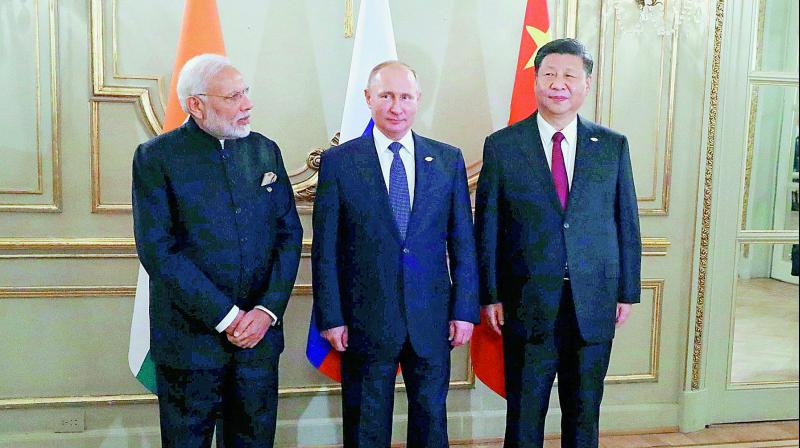PM Narendra Modi holds trilateral meet with Russia, China President
Summit was held hours after meeting with Trump, Abe

New Delhi: India is doing a tight rope-walk, straddling its ties with US and Japan on one hand, and with time-tested friend Russia and China on the other.
Hours after attending a trilateral meeting with US President Donald Trump and Japanese PM Shinzo Abe on the sidelines of the G-20 Summit in Argentina’s Capital Buenos Aires, Prime Minister Narendra Modi held another trilateral meeting with Russian President Vladimir Putin and Chinese President Xi Jinping.
Predictably, the discussions at the two separate meetings were of a very different nature.
While the trilateral RIC (Russia, India, China) meeting sought to focus on global economic issues, ensuring regional peace and stability as well as counter-terrorism efforts, the JAI (Japan, America, India) meeting focused on their strategy in the Indo-Pacific region and a common belief that a “free, open, inclusive and rules based order is essential for the region’s peace and prosperity”.
Experts have seen this Indo-Pacific strategy as a way of dealing with the immense military and economic clout of China in the region.
While the US and Japan have been historical allies after the second world war, Russia and China have forged a new partnership with each other to challenge what they see as the dominance of the US globally. India’s ties with both the US and Japan have strengthened enormously under the Modi Government.
At the same time, India has taken care to strengthen defence cooperation with time-tested friend Russia and repair ties with China significantly after the Doklam military face-off last year.
On the RIC meeting, Foreign Secretary Vijay Gokhale told reporters in Buenos Aires, “It was a very warm meeting, it was a very positive meeting.... The Prime Minister thanked President Putin for initiating this effort and all three leaders felt that given our respective roles as emerging economies and emerging markets, given our respective roles and influence in the world in terms of maintaining peace and stability in the region that it was perhaps important that the three countries should cooperate and coordinate in various areas in order to contribute to global peace and prosperity.”

